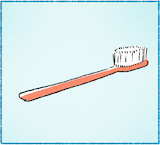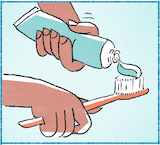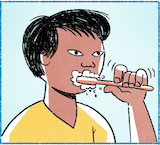


นี้คืออี่หยัง นี้คือแปงสีฟัน
แปงสีฟันมีไว้เฮ็ดหญัง แปงสีฟันมีไว้ถ้าทำความสะอาดฟัน
ด้ามแปงสีฟันสีหญัง ด้ามแปงสีฟันสีแดง
ขนแปงสีฟันสีหญัง ขนแปงสีฟันสีขาว
แปงสีฟันอันใหญ่บ่ บ่ แปงสีฟันอันบ่ใหญ่ แปงสีฟันอันน้อยๆ พอดี
แปงสีฟันมีจักอัน แปงสีฟันมีอันเดียว
แปงสีฟันอันหนึ่งใซ้ได้จักคน แปงสีฟันอันหนึ่งใซ้ได้พุเดียว แปงสีฟันมันสิใซ้ของใผใซ้ของมัน บ่สามาดใซ้นำกันได้
19
เขากำลังเฮ็ดหญัง เขากำลังบีบยาสีฟันใส่แปงสีฟัน
ยาสีฟันหลอดใหญ่บ่ บ่ ยาสีฟันหลอดบ่ใหญ่ ยาสีฟันหลอดพอดี
เป็นหญังคือต้องใซ้ยาสีฟัน เพาะว่าขั้นใซ้ยาสีฟัน สิเฮ็ดให้แข้วเฮาสะอาด ขั้นบ่ใซ้ยาสีฟัน แข้วเฮากะสิบ่สะอาด
เขาใซ้อี่หยังบีบยาสีฟัน เขาใซ้มือของเขาบีบยาสีฟันใส่แปงสีฟัน
เขาบีบใส่หลายบ่ บ่ ใส่บ่หลาย ใส่พอดี ใส่พอปะมาน
20
เขากำลังเฮ็ดหญัง เขากำลังแปงฟัน
เขาใซ้อี่หยังแปงฟัน เขาใซ้แปงฟันกับยาสีฟันแปงฟัน
คือลู้ว่าเขาใซ้ยาสีฟัน กะเห็นฟองในปากของเขา กะเลยฮู้ว่าเขาแปงฟันญ้อนยาสีฟัน
เป็นหญังเขากะคือแปงฟัน บ่ลู้คือกัน เขาอาดสิอยากให้แข้วเขาสะอาด เขากะเลยแปงฟันกะได้
เขาแปงฟันอยู่ใส บ่ลู้คือกันว่าเขาแปงฟันอยู่ใส เขาอาดสิแปงฟันอยู่ในห้องน้ำกะได้
Link to overview page
Link to dictionary
| Isaan | Pronunciation | Tones | Thai | English/Notes |
|---|---|---|---|---|
| นี้ | ni: | HF | นี้ | 1. this 2. here |
| คือ | khʉ: | HR | คือ | 1. to be, to resemble, like, as 2. why {บักหล้าคือบ่เก็บโต่ะแน่ = [addressing a young boy] Why haven't you cleared the table?} |
| อี่หยัง | i:-yaŋ | H-M | อะไร | 1. what {นี้คืออี่หยัง = What is this?} {มื้อนี้เจ้าเฮ็ดอี่หยัง = What are you doing today?} {กินเข้างายกับอี่หยัง = What did you have for breakfast?} 2. something, anything, (in negations) nothing {บ่ต้องเฮ็ดอี่หยังอีกเลยนอกจากใส่ปุย = [we] don't need to do anything besides adding fertilizer} |
| แปงสีฟัน | pɛ:ŋ-si:-fan | M-M-HR | แปรงสีฟัน | toothbrush |
| มี | mi: | HR | มี | 1. to have 2. there is |
| ไว้ | wai | HF | ไว้ | 1. to keep, to put, to place, to retain, to save, to reserve {เขาเอาหัวของเขาไว้ใส = Where does she put her head?} {หมาสิเลี้ยงไว้บ้าน = dogs are kept/raised in the house} {ไก่เลี้ยงไว้ในคอก = chicken are kept/raised in a coop} {หน้ามันบังไว้ = the face is covered/not visible} {เขาเอาโทละสับวางไว้หู = he holds the phone to his ear} 2. for {นาลิกาปุกมีไว้เฮ็ดหญัง = What is an alarm clock for?} {หม้อเอาไว้เฮ็ดแนวกิน = a pot is used to make food} {ก่องเอาไว้เฮ็ดหญัง ก่องเอาไว้ใส่ของ = What is the box for? It's for putting in stuff.} Notes: see also ไว้ถ้า |
| เฮ็ด | het | H | ทำ | to do, to make |
| หญัง | ɲaŋ | M | อะไร, เป็นหญัง = ทำไม | 1. what {เขากำลังเฮ็ดหญัง = What is he doing?} {ธูปเอาไว้เฮ็ดหญัง = What are incense sticks for?} 2. something, anything, (nothing) 3. เป็นหญัง[...]คือ in initial position: why {เป็นหญังเขาคือใส่บักพิกลงไปในกวยเตียว = Why is he putting chili in [his] noodle soup?} {เป็นหญังหน้าต่างมันคือเปิด = Why is the window open?} {เป็นหญังมันคือมีควนไฟ = Why is there smoke?} |
| ไว้ถ้า | wai-tha: | HF-LF | usually in a positive statement or answer: is for, is used for, has the purpose of {กะทะมีไว้ถ้าทอด = a pan is for frying} {น้ำบักนาวมีไว้ถ้าปุงอาหาน = lime juice is used to season food} {ปากกามีไว้ถ้าเขียน = a pen is for writing} {กะเทียมเอาไว้ถ้าเฮ็ดแนวกิน = garlic is used to make food} {ขาเอาไว้ถ้าญ่าง = legs are for walking} {เกิบเอาไว้ถ้าใส่ = shoes are for wearing} Notes: see also ไว้ |
|
| ทำความสะอาด | tham-khwa:m-sa-a:t | HR-HR-M-LF | ทำความสะอาด | to clean, to clean up, to do the cleaning |
| ฟัน | fan | HR | ฟัน | tooth Notes: see also แข้ว |
| ด้าม | da:m | HF | ด้าม | handle |
| สี | si: | M | สี | 1. color 2. colored pencil, crayon |
| แดง | dɛ:ŋ | M | แดง | red |
| ขน | khon | M | ขน | 1. hair (especially body hair) 2. bristles 3. to carry, to transport {ลดขนของ = transport vehicle} |
| ขาว | kha:o | M | ขาว | white |
| อัน | an | M | อัน | 1. thing, object 2. general clf. for objects |
| ใหญ่ | ɲai | H | ใหญ่ | large, big |
| บ่ | bɔ: | H | ไม่ | 1. no, not 2. question particle, transforming a statement into a question Notes: spelling exception in line with common usage on social media |
| น้อย | nɔ:i | HF | น้อย | 1. few, little 2. small |
| พอดี | phɔ:-di: | HR-M | พอดี | 1. to fit well 2. appropriate, just enough, just right {กะจกบานบ่ใหญ่ กะจกบานพอดี = not a large window, just right} {พอดีมือของเฮา = just right for his hand} 3. just in time, at the right moment, just this moment {แล้วพุซายคนนี้กะญ่างมาพอดี = and the man has come just now} |
| จัก | jak | M | จัก | 1. answer to a question: [I] don't know, don't know exactly, [I'm] not sure {พุซายคนนี้เขาเถ้าไป่ จัก จักเถ้าหลือบ่เถ้า เบิ่งบ่ค่อยออก = Is this man here already old? I don't know. I can't see clearly whether he's old or not.} {เขาเว้ากันอยู่ใส จักคือกัน = Where are they talking? I don't know either.} 2. exact(ly), what exactly {จักต้มอี่หยังกะบ่ฮู้ = I don't know what (exactly) he is cooking} {บ่ลู้คือกันจักปาอี่หยัง = I don't know either what kind of fish this is} 3. how much/many? {ต้นไม้มีจักต้น = How many trees are there?} {ตอนนี้จักโมงแล้ว = What time is it now?} {มือของเฮานี้สิมีจักนิ้ว = How many fingers do our hands have?} 4. a bit, a little bit {จักหน่อย/จักหน่อยหนึ่ง = a bit, a little bit} |
| เดียว | di:ao | M | เดียว | only, alone, single |
| หนึ่ง | nʉŋ | H | หนึ่ง | 1. one 2. after adjective: intensifier {บักคักหนึ่ง = very much} {อันบักใหญ่หนึ่ง = very large}, or attenuates the meaning {กะดาดมันแผ่นน้อยๆ หนึ่ง = the piece of paper is [relatively] small} |
| ใซ้ | sai | HF | ใช้ | to use |
| ได้ | dai | HF | ได้ | 1. can 2. to get, to obtain 3. before verb: indicating past tense 4. บ่ได้ + verb: not |
| คน | khon | HR | คน | person, people |
| พุเดียว | phu-di:ao | H-M | คนเดียว | 1. alone, by oneself {เขากำลังยืนอยู่พุเดียว = she's standing by herself} {เขานั่งอยู่พุเดียว = he's sitting by himself} 2. one person |
| มัน | man | HR | มัน | it (also used to refer to people) |
| สิ | si | M | จะ | future tense auxiliary {เขากำลังสิตื่น = he's about to wake up} {สิไปตะหลาด = [I'm] going to the market} |
| ของ | khɔ:ŋ | M | ของ | of, belonging to |
| ใผ | phai | M | ใคร | 1. who {พุซายคนนี้เป็นใผ = Who's this boy?} 2. somebody, someone, anybody, with negative: nobody {บ่มีใผอยู่หนี้จักคนเลย = there's not a single person here} |
| สามาด | sa:-ma:t | M-HF | สามารถ | can, to be able |
| นำกัน | nam-gan | HR-M | together, jointly, with one another {บ่สามาดใซ้นำกันได้ = can't be used together} {เขากำลังญ่างนำกัน = they are walking together} {เหล้นบ่าดนำกันบ่ = Shall we play basketball?} | |
| เขา | khao | M | เขา | personal pronoun: he, she |
| กำลัง | gam-laŋ | M-HR | กำลัง | auxiliary indicating continuous or progressive action |
| บีบ | bi:p | LF | บีบ | to squeeze, to press |
| ยาสีฟัน | ya:-si:-fan | M-M-HR | ยาสีฟัน | toothpaste |
| ใส่ | sai | H | ใส่ | 1. to put something in/on {เขาใส่บักพิกในกวยเตียวหลาย = he's putting a lot of chili in his noodle soup} {เขาบีบยาสีฟันใส่แปงสีฟัน = he squeezes toothpaste on the toothbrush} {ก่องเอาไว้ใส่ของ = boxes are there to put stuff in} 2. to wear (clothes) {เขาใส่เสี้ยแขนญาว = he's wearing a long-sleeve} 3. directed at {เอิ้นใส่กัน = to call each other/to say to each other} {หมามันเห่าใส่แมว = the dog barks at the cat} {ล้องเพงใส่ไม = to sing into the microphone} {เขากำลังซี้มือไปใส่พุซาย = she's pointing at the man} |
| หลอด | lɔ:t | LF | หลอด | 1. tube 2. drinking straw 3. clf. for tubes (e.g., toothpaste, neon tube), drinking straws |
| เป็น | pen | M | เป็น | 1. to be, to exist 2. to be able to 3. to suffer, sth. happens to 4. เป็นหญัง[...]คือ in initial position: why? {เป็นหญังเขากะคือแปงฟัน = Why is he brushing his teeth?} {เป็นหญังเคี่ยงบินมันคือสิตก = Why is the airplane falling down?} |
| ต้อง | tɔŋ | HF | ต้อง | to have to, must |
| เพาะว่า | phɔ-wa: | H-H | เพราะว่า | because |
| ขั้น | khan | LF | เมื่อ | when, if |
| ให้ | hai | LF | ให้ | 1. to give {หมอกำลังเอายาให้คนป่วยกิน = the doctor is giving the patient medicine} 2. for 3. to allow, to be allowed |
| แข้ว | khɛ:o | LF | ฟัน | tooth {หมามันมีแข้ว = the dog has teeth} |
| เฮา | hao | HR | เรา | 1. personal pronoun: we 2. personal pronoun: I |
| สะอาด | sa-a:t | M-LF | สะอาด | clean |
| กะ | ga | M | ก็ | 1. then, consequently 2. also |
| มือ | mʉ: | HR | มือ | 1. hand 2. front leg/paw (e.g., of a cat) |
| หลาย | la:i | M | เยอะ, มาก | many, much, very |
| พอปะมาน | phɔ:-pa-ma:n | HR-M-HR | พอประมาณ | moderately |
| แปง | pɛ:ŋ | M | แปรง | 1. brush 2. to brush |
| กับ | gap | M | กับ | 1. and {ลุงกับป้า = uncle and aunt} {กวยเตียวหมูกับกวยเตียวไก่ = noodle soup with pork and noodle soup with chicken} 2. with, to {ค้ายๆ กับคำว่า ... = similar to the word ...} 3. prefix in front of foods {กับเข้า = side dishes eaten with rice} {เขากินกับกวยเตียว = he's eating noodle soup} |
| ลู้ | lu: | HF | รู้ | 1. to know 2. to understand Notes: equivalent to ฮู้ |
| ว่า | wa: | H | ว่า | 1. that, as {คำว่า X = the word X} 2. to say |
| เห็น | hen | M | เห็น | to see |
| ฟอง | fɔ:ŋ | HR | ฟอง | 1. bubble 2. foam (soap, beer) |
| ใน | nai | HR | ใน | in, within |
| ปาก | pa:k | LF | ปาก | mouth |
| เลย | lə:i | HR | เลย | 1. futher on, beyond, past {เข็มน้อยเลยเลขสิบสองไป = the minute hand has passed number twelve} 2. too much 3. at all 4. definitively 5. completely, utterly |
| ฮู้ | hu: | HF | รู้ | 1. to know 2. to understand Notes: equivalent to ลู้ |
| ญ้อน | ɲɔ:n | HF | เพราะ | 1. with the aid of {เขาปิดโทละทัดญ้อนลีโหมด = he uses the remote to switch off the TV} {เขาแปงฟันญ้อนยาสีฟัน = he brushes his teeth with/using toothpaste} 2. because, because of {เป็นหญังมันคือสิละลาย กะญ้อนว่ามันฮ้อน = Why is [the ice cream] melting? Because it's hot!} |
| คือกัน | khʉ:-gan | HR-M | เหมือนกัน | 1. also, likewise, similarly {ยินดีที่ได้ฮู้จักคือกันคับ = Nice to meet you too!} 2. in negative sentences: either {บ่ลู้คือกัน = I don't know either} {จักคือกัน = I don't know (either)} |
| อาด | a:t | LF | อาจ | 1. might, may, will 2. likely |
| อยาก | ya:k | LF | อยาก | to want, to wish |
| อยู่ | yu: | H | อยู่ | 1. to be (located) at 2. yet, still 3. auxiliary indicating continuous or progressive action {ทอดปาอยู่ในกะทะ = (in the process of) frying a fish in the pan} {แม่กำลังเมี้ยนเฮียนอยู่ = mother is cleaning/tidying up the house} |
| ใส | sai | M | (ที่)ไหน | 1. where? {สิไปใส = Where are [you] going?} {มาแต่ใส = Where are [you] coming from?} {กะทะอยู่ใส = Where's the pan?} 2. somewhere, anywhere {ใสกะได้ = anywhere, wherever you like} |
| ห้องน้ำ | hɔŋ-na:m | LF-HF | ห้องน้ำ | bathroom |